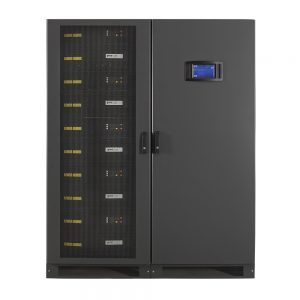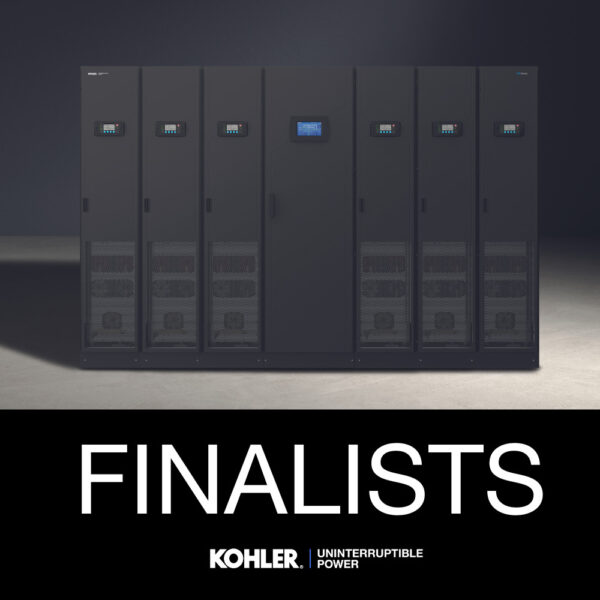What does the future hold for UPS technologies and uninterruptible power supplies? We asked Alan Luscombe, Director at KOHLER Uninterruptible Power, for his views, as summarised below.
Currently, the hottest UPS battery topic is the lithium-ion vs. VRLA lead-acid debate. Li-ion offers several advantages, including lower TCO, longer life, smaller size and weight, and higher operating temperature tolerance. However, although li-ion market share has been growing steadily over the last two-three years, especially as prices have been dropping, VRLA is not expected to disappear soon. The biggest barrier appears to be li-ion’s higher initial cost.
We have seen steady growth in demand for modular UPS systems technology over the last two years, especially in higher-power applications. While uninterruptible power supplies below 200kVA are widely available, there is currently only two competitors for our PowerWave 9000DPA, and our KOHLER PW 9500DPA at 500kVA is unique for now. However, players are entering the market for 300kVA UPS power supplies and beyond. We are also seeing more Asian products coming onto the UK market.
As winter approaches, we have no tangible evidence of utility power problems – there currently appears to be ‘just enough’ capacity. More nuclear energy capacity will ease the pressure, but this is very slow in developing.
Business forecasting is difficult, with so many unknowns, primarily Brexit. An IHS Research forecast for the UK predicted a negative economic impact from Brexit, but actually the economy has continued to grow. The largest effect has come from the falling pound.
Another trend that will continue after Brexit is the government’s commitment to reducing carbon emissions. Compliance criteria will become ever more stringent, while the Department of Energy and Climate Change’s Enhanced Capital Allowance (ECA) scheme rewards eligible energy-saving equipment with tax breaks. These realities, plus the threat of higher energy costs, are driving the market for higher-efficiency uninterruptible power supplies, with efficiency norms moving from 95% to 96% now, and 97% is forecast.
There is also an increasing demand for UPS power supplies capable of dynamically adjusting their UPS capacity, and especially reducing it to improve UPS efficiency, if the load is unexpectedly low. This facility is useful in converged, virtualised data centre infrastructures, where servers are dynamically allocated – or de-allocated – to match changing software workloads.
Users increasingly expect to see their uninterruptible power supply online as an intelligent network node. Specifically, they want immediate warning of impending problems, enabling rectification before power problems arise. Allowing third-party UPS maintenance organisations to run a predictive maintenance service through 24/7 remote UPS monitoring is particularly important.
UPS systems intelligence can also aid longer-term power system management and optimisation, through load monitoring, regular reports on the uninterruptible power supply status, and analysis of trends over time.
45% of all applications are within data centre operations, with increasing demand for hyperscale facilities where 400 – 500kVA UPS systems are regarded as basic building blocks. Such uninterruptible power supplies are either coupled together for even greater UPS capacity, or distributed around a large facility. Ireland is providing a key market for these large UPS installations, with €2b invested over five years, and a further €2b from 2020. Organisations involved include Amazon, Facebook, Microsoft, Apple, Vodaphone and Google.
Smaller, modular UPS systems are also important parts of data centre designs, with a growth of 15% pa seen over the last five years. These allow convenient, incremental expansion in, say, 100kVA steps. Complete, prefabricated data centre solutions can add UPS capacity rapidly as needed.
25% of the UPS power supply market is occupied by smaller server rooms operated by branch offices or SMEs. Although this share is significant, growth has slowed, probably due to increased outsourcing.
Irrespective of how IT resources are deployed, continued growth seems inevitable; driven by factors including the Internet of Things, online business and entertainment services, smartphones and social media.
If you have any questions about our UPS power systems or services please get in touch with KOHLER Uninterruptible Power via our contact page or call us on 0800 731 3269.





